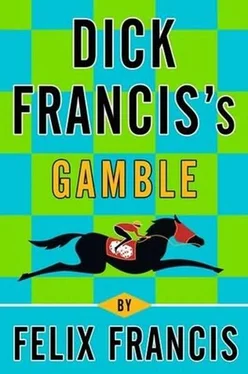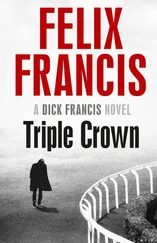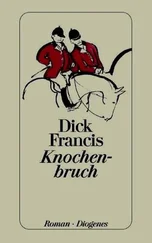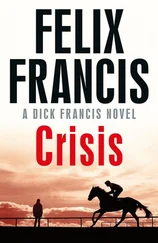“Maybe that was just a front,” said the detective, writing a note.
“My, you do have a suspicious mind,” I said.
“Yes,” he said, looking up. “And it’s surprising how often I’m right.”
Could he really be right? Could Herb and Jessica have been fooling the rest of us all this time? And could anyone else at the firm also be involved? I told myself not to be so silly. At this rate I would soon be distrustful of my own mother.
“And do you also think Mr. Kovak was a bit of a maverick?”
“No,” I said, “not really. He was just a flamboyant American in a business where people have a bit of a reputation for being boring.”
“And are you boring?” he said, looking up at me.
“Probably,” I said. I was certainly more boring now than I had been as a jockey. But maybe it was better being boring and alive than flamboyant and dead.
Ireturned to the reception area after my interview to join the other fifteen members of the firm squashed into the client waiting area that had been designed for just a small coffee table and two armchairs.
“What did they ask you?” Jessica said.
“Not much,” I said, looking at her and trying not to let her see in my face the questions about her that the chief inspector had triggered in my mind. “They just want to know what Herb did here and why I thought anyone would want to kill him.”
“Surely he wasn’t killed because of his work.” Jessica looked shocked. “I thought it must be to do with his private life.”
“I don’t think they have the slightest idea why he was killed,” said Patrick Lyall. “That’s why they’re asking about everything.”
There was a slight commotion outside in the lobby as someone not on the company staff list tried to gain access. He was being barred by our rather overbearing uniformed guard. I could see through the glass door that the would-be visitor was Andrew Mellor, the company solicitor. Lyall & Black was too small to have a full-time company lawyer of its own so we used Andrew, who worked in a legal practice around the corner in King William Street.
Patrick saw him as well and went over to the door.
“It’s all right, officer, Mr. Mellor is our lawyer.”
“But he’s not on my list,” said the uniformed policeman adamantly.
“It was I who provided that list and I forgot to add Mr. Mellor.”
Reluctantly the policeman stood aside and allowed the visitor to enter.
“Sorry, Andrew,” said Patrick. “It’s all a bit of a nightmare here at present.”
“Yes, so I can see.” Andrew Mellor looked around at the sea of faces. “I’m so sorry to hear about Herb Kovak. Unbelievable business.”
“And bloody inconvenient too,” interjected Gregory, who had been mostly quiet since his altercation with the chief inspector earlier. “But I’m glad you’re here.” I wondered if Gregory had asked Andrew to come around to be present during his interview. “We’ll have to talk outside.” Gregory began to ease himself up from one of the armchairs.
“Actually, Gregory,” said the lawyer, putting up a hand to stop him, “it’s not you I have come to see. I need to talk to Nicholas.” Fifteen pairs of eyes swiveled around in my direction. “Do you mind?” he said to me, holding out his arm towards the door.
I could almost feel the stares on my back as I went outside into the lobby with Andrew. We went past the lifts and around a corner so that the prying eyes in Lyall & Black could no longer see us through the glass door and the policeman on guard couldn’t hear our conversation.
“Sorry about this,” he said, “but I have something to give you.”
He pulled a white envelope out of his jacket inside pocket and held it out to me. I took it.
“What is it?” I asked.
“Herb Kovak’s Last Will and Testament.”
I looked up from the envelope to Andrew’s face.
“But why are you giving it to me?” I asked.
“Because Herb named you in it as his executor.”
“Me?” I said, somewhat taken aback.
“Yes,” Andrew said. “And you are also the sole beneficiary of his estate.”
I was astonished. “Has he no family?”
“Obviously none that he wanted to leave anything to.”
“But why would he leave it to me?” I asked.
“I’ve no idea,” Andrew said. “Perhaps he liked you.”
Little did I realize at the time how Herb Kovak’s legacy would turn out to be a poisoned chalice.
On Tuesday I went to the races-Cheltenham Races, to be precise. But this was no pleasure outing, it was work.
Racing can be a funny business, especially amongst the jockeys.
Competition is intense. It always has been. Before the advent in 1960 of the racing patrol films to aid the stewards in catching the wrongdoers, stories abounded of jockeys who would cut off a rival, giving them no room, literally putting a horse and rider through the wings of a fence in order to help their own chances of winning. And riding whips have not always been employed solely to strike the horses but have left their mark on jockeys too. On one famous occasion at Deauville in France, Lester Piggott, having dropped his own whip, took one from one of the other jockeys during the race, to help him ride a tight finish.
But once the race is run, whatever the result, there exists a camaraderie between these men and women who risk their lives five or six times an afternoon for the entertainment of others. And they look after their own.
Such it was with me.
My erstwhile opponents who, during my riding days, would have happily seen me dumped onto the turf if it meant that they could win a race, were the first to express their concern and support when I’d been injured.
When I had been forced to retire at the ripe old age of twentyone, it had been a handful of my fellow jocks who had arranged a testimonial day for me at Sandown Park to raise the funds needed to pay my university tuition fees. And it had been the same individuals who had clamored to become my first clients when I’d qualified as an IFA.
Since then I had acquired a bit of a reputation as horse racing’s very own financial adviser. Nearly all my clients had some connection with racing, and I had a near monopoly within the jockeys’ Changing Room that I believed had much to do with a shared view of risk and reward.
So I now regularly spent a couple of days a week at one racetrack or another, all with Patrick and Gregory’s blessing, making appointments to see my clients before or after, and occasionally during, the racing.
Cheltenham in April has a touch of “after the Lord Mayor’s Show” about it-rather an anticlimax following the heady excitement of the four Steeplechasing Festival days in March. Gone were the temporary grandstands and the acres of tented hospitality village. Gone too was the nervous energy and high anticipation of seventy thousand expectant spectators waiting to cheer home their new heroes.
This April meeting may have been a more sedate affair in the enclosures, but it was no less competitive on the track with two of the top jockeys still vying to be crowned as the champion for the current season that concluded at the end of the month. Both were my clients, and I had arranged to meet one of them, Billy Searle, after racing.
Part of the government’s anti-money-laundering requirements was that financial advisers had to know their clients, and Lyall & Black, as a firm, reckoned that a face-to-face meeting with every client should occur at least annually, in addition to our regular three-monthly written communications and twice-yearly valuations of their investments.
I had long ago decided that expecting racing folk to come to a meeting in the London offices was a complete waste of time. If I wanted them as clients-and I did-then I would have to come to see them, not vice versa. And I had found that seeing them at their place of work, the racetracks, was easier than chasing them down at home.
Читать дальше












